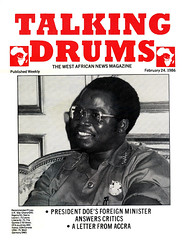Hello Ali Baba, Long Live Arabella
A Touch Of Nokoko
By Kofi Akumanyi
Remember those films of a swashbuckling actor like Errol Flynn with the barely audible sound-track which was often completely lost among the chatter of the spell-bound audience? Opayin Tweneboah's "yard" served as a film theatre when the itinerant cinema entrepreneur came to our village.
You see, if you lived in a town like Ahweasi in the fifties, you had no permanent cinema house and Duku's hobby was provided by the roving cinema van which would come to town with a three- man personnel the boss, projectionist and a ticket collector, an elderly generator, an 8mm projector and a couple of films held together with pieces of adhesive tapes.
Many times during the showing of a film it would snap just when the "Blowman' was at his best, whereupon the eardrum splitting whistling to call the OPERATOR would rent the air. However, these interruptions, if nothing at all, did serve to heighten the carnival atmosphere which the cinema enthusiasts, including Duku, made the most of.
What were the films on offer? Not much, but that did not worry the cinema addicts in any way. Some had seen the same films ten times over but it did not diminish their appetite one jot. The monthly dosage of war films by Buster Crabbe and Burt Lancaster, jungle business from Tarzan Johnny Weismuller, cowboys versus Indians in the three man/animal-team of Roy Rogers, Dale Evans and the horse "Trigger", John Wayne fighting on the plains and swashbuckling stuff from the likes of Errol Flynn, to mention a few, gave the villager cinema addicts the time of their lives. OK, the sound-track was often not too good, but who cared?
Thinking now about why the village town mobile cinema circuit served such a hotch- potch 'diet' of films, I realise that perhaps the entrepreneurs really cottoned on to the Hollywood magic very fast and unwittingly supplied the seeds of cultural imperialism which was to bloom into full maturity later on. What we did not know at the time was that the Hollywood monopoly was about to come under serious attack from the East - with what became popularly known as Indians films
The Lebanese/Indian film theatre owners in Accra apparently took advantage of the cheaper rentals and within a few years the oriental films spread like wild fire throughout the length and breadth of the country, with the majority of the patronage coming from the Zongo community, who for some reason I have never been able to unravel, believed it had a special cultural affinity with India. Incidentally, the same process brought in the popular martial art films of Bruce Lee in the sixties and late seventies.
Many times during the showing of a film it would snap just when the "Blowman" was at his best, whereupon the eardrum splitting whistling to call the OPERATOR would rent the air. However, these interruptions, if nothing at all, did serve to heighten the carnival atmosphere which the cinema enthusiasts, including Duku, made the most of.
Be that as it may, Indian films soon grabbed us all by the throat and thoroughly shook us to our very foundations. The day that an Indian film came to town was always special, the Zongo community cinema- goers sometimes dressed the part for the show. Mariama, the beautiful Dagomba girl, daughter of the Zongo chief nearly always played the part of the heroine of the film. Before long all the school girls and boys learnt to sing and dance the Indian way.
What about the language? Apparently, having got used to the scratched westerns of the roving cinemas with inaudible sound tracks, the Indian movies with clear sound- tracks punctuated with singing and dancing, the language did not matter so long as "Arabella" (a box office hit and the name of the hero of the film) did what was expected of him.
If you ask any dedicated Indian film lover what is the most memorable film he has ever seen I am sure the majority would, without any hesitation, mention "Mother India". I remember when it first came to our village, the first days showing was so talked about that it stayed for one week. Opanyin Tweneboah's yard was packed daily. It was, indeed, the first acknow- ledged box office hit. From that day, the village of Ahweasi made a decision that cowboys and Indians were definitely bad for their health and gave Indian films the thumbs up.
That was many, many years ago when my friend Duku and I were children growing up in a community starved of variety of entertainment.
A couple of years back I met Duku, now a businessman domiciled in Takoradi, on a business trip to Accra. We talked about this and that and the conversation finally settled on what films he had seen lately and what were on offer at the various theatres. The paucity of the selection of films was appalling, so we decided to revisit our Indian film-going days by going to one of the most patronised cinema theatres in Accra - DUNIA, strategically positioned, at the time, right besides a malodorous rubbish dump at the edge of Nima in Accra.
We picked a day and bought our tickets to see an advertised film (Dunia, by the way, specialises in Indian films) and were totally surprised to find out that the village Indian film loving public was incomparable to this. Everybody sang along with the actors and actresses and generally enjoyed themselves, not caring one hoot about the language of the film, which this time carried subtitles. It was an experience. The only trouble was that we did not bargain for the bed-bugs (or is it wood-bugs?) which heavily infested the seats.
Anyway, the fact remains that the Ghanaian cinema-going public has travelled a long way from the fifties.
…
